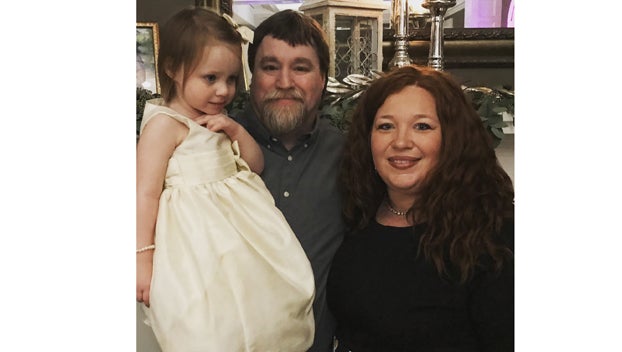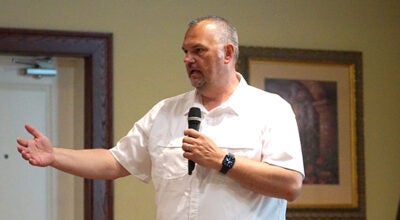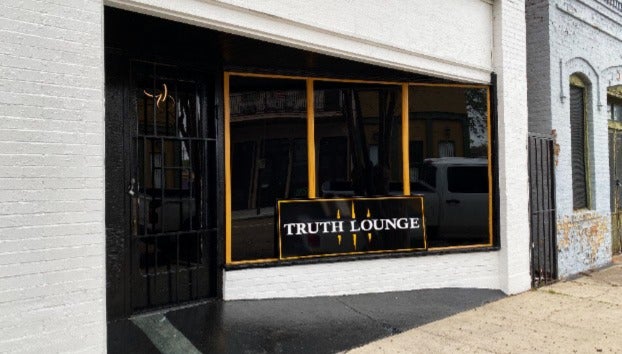Life after opioids: One woman’s story
Published 12:01 am Monday, June 18, 2018

- | The Natchez Democrat From left are Stella, 3, Jack and Angela Mallette. Angela suffered an opioid addiction following the miscarriage of her first child. She met her husband Jack in Jackson, where she received court-ordered treatment. Angela is now the outreach coordinator for Stand Up Mississippi.
NATCHEZ — The deaths from drug overdoses are increasing year after year, experts say, as the nation is in the grips of an opioid crisis, and Natchez is no exception.
Madison resident Angela Mallette, outreach coordinator for Stand Up Mississippi, will be at a 6:30 p.m. Tuesday meeting at the Natchez Convention Center to discuss the opioid problems.
She will be one of several presenters from the departments of mental health, public safety and human services, the Mississippi Bureau of Narcotics, the FBI, the DEA and the Mississippi Board of Pharmacy.
Mallette has made it her mission to inform people about the opioid crisis, and her passion, she said, stems from her personal experience with opioid addiction.
“My addiction started kind of late — I was 27 years old,” she said. “Following a miscarriage from my first pregnancy, I was prescribed opioids.”
Mallette said her doctors had to perform a cesarean after her unborn child had died.
“These pills … masked the pain,” she said. “Not only did they mask the physical pain. They masked the emotional pain that I didn’t want to deal with. I was able to go back to work right away.”
Mallette said she continued taking prescription opioids over the next two years and when she could no longer get them from her doctor, she started buying them illegally.
“Addiction caused me to lose my job, my home and to alienate my family and eventually I got arrested.”
At the time, Mallette lived in Ocean Springs where she grew up, she said, and after she was arrested she received a court order for treatment at Friendship Connections in Jackson.
“It’s kind of hard to put into words what those women (at Friendship Connections) did for me,” Mallette said. “One thing that they did do for me is tell me, ‘It’s OK. You’ve made some bad decisions but that does not mean that you are a bad person. You can overcome this. You can stand up and face the world again.’”
Mallette said she met her husband in Jackson, and they now have a 3-year-old daughter named Stella.
“Everything those ladies told me was true,” Mallette said. “All of the things that I was so broken about before, I now have and so much more.”
Natchez Mayor Darryl Grennell said Tuesday’s meeting in the Convention Center will serve two primary functions: to inform everyone about the problem that exists in Adams County and to help those who either have an addiction or are affiliated with someone who does.
“According to the data, we’ve got a pandemic in Adams County for opioid use,” Grennell said. “The purpose of the meeting … is to make people aware of the pandemic in this area and, primarily, my mission is to provide the resources and information for people who need help.”
A 2017 census shows the population in Adams County as being 31,248 people and, according to the Mississippi Bureau of Narcotics, there were 36,502 opioid prescriptions written the same year — 5,254 more prescriptions than the population.
Grennell said it is important for the citizens of Adams County to understand and distinguish the proper use of opioid drugs from a problematic use.
“We want to try to prevent any faulty use of opioids and to help people with a problem,” he said.
“I understand there are cases where people have chronic pain and have justified uses for opioids. The cases where it can be prevented — that’s the purpose of this town meeting.”
Mallette said the number of deaths caused by drug overdose has spiked in Mississippi in the last year alone.
“There were 211 deaths from overdose in 2016 and 256 deaths in 2017,” she said. “The overdose death tolls are consistently rising (in Mississippi). (Stand Up Mississippi is) trying to work on a state level with all of the officials to prevent this problem from spreading more.”
Mallette said the state has received a two-year, $7.2 million opioid grant to help people who are suffering from opioid use.
“We’ve done about 20 of these meetings around the state, and every one we go to, the number (of attendees) gets bigger and bigger,” she said.
“Just because you have faced addiction, does not mean you cannot overcome it and move forward. Addiction is not an immoral failing. It’s a disease. It is time that we start treating it as such.”





